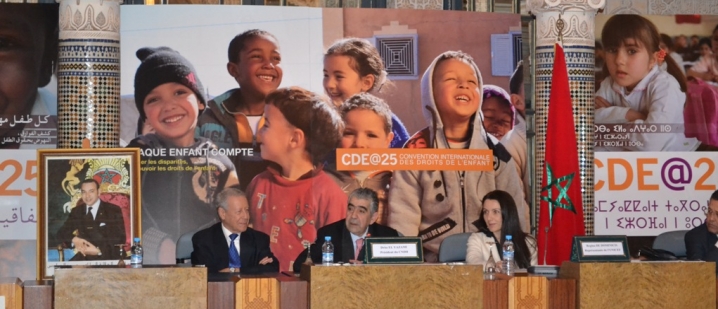UNICEF World Report: Every Child Counts

The United Nations Children’s Fund (UNICEF) presented its report, on the state of the world’s children 2014, in Morocco at a press conference at the main office of the National Human Rights Council (CNDH) in Rabat, on April 2, 2014.
Titled THE STATE OF THE WORLD’S CHILDREN 2014 IN NUMBERS Every Child Counts: Revealing disparities, advancing children’s rights, the report is fruit of several surveys conducted by UNICEF and its partners. It highlights the progress made in the world and also identifies disparities and inequalities in the realization of children’s rights worldwide. It analyzes the performance of different countries, including Morocco, in the realization of the right to life and survival, the right to health, the right to education, the right to protection and participation, etc.
Ms Regina De Dominicis, UNICEF Representative in Morocco outlined the report and highlighted the progress made in recent years in favor of the 2.2 billion children in the world, improving the state of the world’s children and the quality of their lives. According to the report, about 90 million children who would have died if mortality rates had stuck at their 1990 level have, instead, lived past the age of 5, improvements in nutrition have led to a 37 per cent drop in stunting since 1990, Primary school enrolment has increased, even in the least developed countries (…) by 2011 the rate had improved to 81 per cent, nearly 1.9 billion people have gained access to improved sanitation since 1990, etc.
However, the report says, some 6.6 million children under 5 years of age died in 2012, mostly from preventable causes, their fundamental right to survive and develop unrealized, 15% of the world’s children engage in child labour that compromises their right to protection from economic exploitation and infringes on their right to learn and play, 11% of girls are married before they turn 15,7 jeopardizing their rights to health, education and protection, the right to freedom from cruel and degrading punishment is violated whenever children are subjected to violent discipline at home or in school.
Morocco has made significant progress particularly in school enrollment rate which reached 94% and vaccination rate which is almost at 100 %, Ms De Dominicis said. Maternal mortality ratio decreased from 187 to 21 deaths per 100000 live births in 2012. However, she added, child labor is at 8 % and early marriage for girls is at 16 %.
Speaking on this occasion, CNDH Chairman, Mr. Driss El Yazami, shed light on the efforts made for the protection and promotion of children’s rights in Morocco, mainly at the legislative level. Public and private actors and civil society have endeavored to align national laws with the international instruments. Legislative reforms were taken to ensure this compliance. This included the Criminal Code, the Code of Criminal Procedure, Law # 14.05 on social protection institutions, the civil status law, the Kafala (adoption) law, etc.
Progress, he indicated, has also concerned primary school enrollment (99%) and vaccination (almost at 100 %). However, Mr. El Yazami said, dropout rate is alarmingly high (after primary school), the right to life is seriously compromised, since 24 per 1000 children die in Morocco before reaching their first birthday, the right to a harmonious development is not always guaranteed, malnutrition for children is at 14.9%, nearly 100000 children work in Morocco, etc.
Mr. El Yazami also highlighted the importance of the right to participation for children, which receives little attention, and the right to protection against abuse and violence, an issue that should be given due attention.
Morocco is a member state to the Convention on the Rights of the Child (CRC) and its two Optional Protocols. It has ratified several ILO Conventions including Convention 138 and Convention 182 on child labor. Morocco will submit and discuss its periodic report on children's rights in Geneva next September. The CNDH will present a shadow report on the occasion.
A joint plan of action was concluded between the CNDH and UNICEF. It sets the framework for future cooperation between the two institutions. It included several activities: establishing a redress mechanism, supporting and encouraging the establishment of a working group on children's rights in Parliament, building the capacities of civil society networks to monitor and report on the implementation of the CRC, drafting a White Paper on the rights of the Child made by children themselves, etc.






















